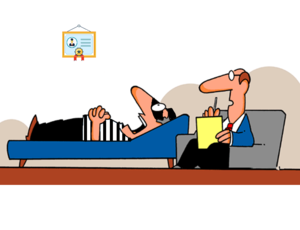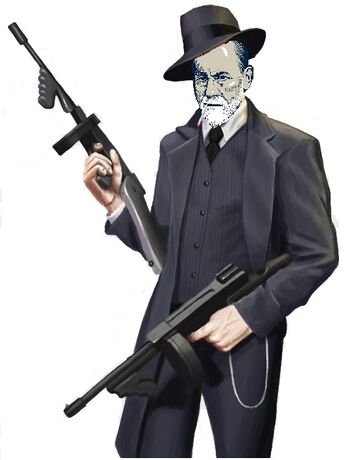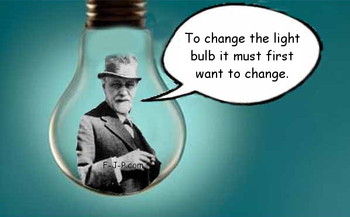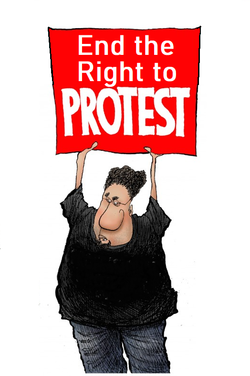Criminal psychologists
Psychology is the scientific study of mind and behaviour, including the study of both conscious and unconscious phenomena. The Greek letter Ψ has long denoted psychology due to its common pronunciation as psi, and because of its cool similarity to Poseidon’s mighty trident – which is in no way a substitute penis. Or is it?
It was, perhaps, inevitable that the discipline would give rise to a new species of villain dedicated to the study of perception, cognition, emotion, subjective experience, and brain function, and to discovering ways to enrich themselves through the illicit, unlawful, and felonious activities they inspired in their patients. Thus was born the Criminal Psychologist, whose field of study began in earnest in the late Nineteenth Century but has its roots in pre-history. Indeed, there is mounting evidence of cave-dwelling psychologists carefully piercing holes in the skulls of their kin with flint-drills to release malevolent spirits that disturbed their thoughts, while simultaneously bludgeoning holes in the skulls of their neighbours when adjacent tribes had access to shinier rocks.
History[edit]
Ancient Egyptian Papyri mention manic-depression and related thought disorders. Perhaps the first identifiable criminal psychologist in history, Pthah-Hokum, recommended taking advantage of patients’ depressive phases to convince them to sign over their worldly goods, and then feeding them strong wheat-beer during the subsequent manic phase to encourage them to wrestle crocodiles or play catch with sphinxes.
Both Plato and Aristotle addressed the workings of the mind, and there is good reason to suspect that both sought to gain a deeper understanding of the mind’s workings pharmaceutically. It is difficult to otherwise explain Aristotle's insistence that the moon was made of earwax, or Plato's belief that humans are featherless birds. Neither man seems to have been able to keep themselves off the wacky-baccy long enough to exploit their philosophical brilliance for their own gain. By contrast, the straight-living Hippocrates theorised that mental disorders had physical rather than supernatural causes and recommended slowly introducing patients to the use of poppy-derived opiates to alleviate their symptoms and help them to rest. Once hooked, he theorised, patients could be compelled to cut purses in the agora to pay for their new addiction.
In China, psychological understanding grew from the philosophical works of Confucius. He say “body of knowledge involve insight drawn from introspection and observation, Grasshopper. It frames the universe in terms of a division of physical and mental reality. Also, man who make mistake on elevator wrong on many levels.”
In Europe, Theosophy slowly evolved into true Psychology during the Enlightenment period. Not content with torturing future school children with the invention of Calculus, Gottfried Leibnitz argued that mental activity took place on an |indivisible continuum. He suggested that the difference between conscious and unconscious awareness is only a matter of degree. Therefore, he argued, anyone who had ever thought about stealing had de facto committed theft, and would only find forgiveness in the eyes of God by handing the profits of his theoretical criminality to an accommodating, local mathematician/philosopher for safe disposal.
Immanuel Kant was a real piss-ant and very rarely stable but, nevertheless, advanced the idea of psychology as a science. Kant explicitly rejected the idea of experimental psychology, writing that "the empirical doctrine of the soul can also never approach chemistry even as a systematic art of analysis or experimental doctrine, for in it the manifold of inner observation can be separated only by mere division in thought, and cannot then be held separate and recombined at will (but still less does another thinking subject suffer himself to be experimented upon to suit our purpose), and you’re really not going to read to the end of this interminable sentence, are you?"
He believed that Europeans to be the only true humans and that other races were, therefore, less than human. He used this reasoning to organise the 1784 Konigsberg pogrom, shortly after which he came into possession of the freehold of what had been the main synagogue in the Jewish Quarter of Prussia. Leading newspaper of the day, Die Deutsche Nachrichtengebenwahrheitaufdecken und Zeitung'', reported that he had made an estimated two million marks from the sale of “four golden menorahs, a besamim spice holder carved from a single ruby, a pair of jewel-encrusted incense burners, two dozen silver kiddush cups, and an 80-gallon ritual bath in Platinum and Electrum – abandoned by their previous owners, believed deceased.”
Famous Criminal Psychologists[edit]
Sigmund Freud[edit]
Known to his friends as Sigmund Fraud, this pioneering Criminal Psychologist introduced many of the concepts still In vogue today. Having initially qualified as a doctor in Vienna, in October 1885, Freud went to Paris on a three-month study fellowship. It was here that he learned of the new analytical technique “Mesmerism”, later referred to as hypnotism.
The work of Professor Jean-Martin Charcot had shown our deepest fears could be addressed more effectively while patients’ conscious minds were bypassed. Over a number of years, he had pioneered using past-life regression to cure patients of phobias of spiders, mice and Oxygen, and had allowed a woman long-confined to an asylum to return to her family after dealing with her grief over the death of her childhood hamster. It was Freud, however, who realised that the technique could be used to convince grieving widows to sign blank cheques and to sign over the deeds to their houses.
Once he had set up in private practice back in Vienna, Freud began using hypnosis in his clinical work. The treatment of one particular patient troubled by her traumatic past proved to be transformative. Described as Anna O., she was invited to talk about her symptoms while under hypnosis, and in the course of talking in this way, her symptoms reduced in severity while her bank account reduced in size.
Hypnosis would prove to be at best inconsistent. Freud realised that simply encouraging patients to talk freely, without censorship or inhibition, about whatever ideas or memories occurred to them gave more effective symptom relief and proved him with plenty of leverage for future extortion. In conjunction with this procedure, which he called "free association", Freud found that patients' dreams could be fruitfully analysed to reveal the complex structuring of unconscious material and to demonstrate the psychic action of repression which, he had concluded, underlay symptom formation. By 1896 he was using the term "psychoanalysis" to refer to his new clinical method and hundreds of wealthy Austrians discovered to their surprise that it was their wealth that had initiated the majority of their troubles. Freud lessened their difficulties by passing on the email address of a wealthy Nigerian Prince who offered to take care of their funds while their therapy continued.
Later, Freud postulated that unconscious memories of sexual molestation in early childhood were a necessary precondition for both hysteria and obsessional neurosis and used this revolutionary idea to force the patriarchs of several noble families to commit Suicide rather than face ruin. Grateful families were more than happy to part with tens of thousands of Krone for this service which coincided with a 2% drop in population from Moravia to Romania.
Ivan Pavlov[edit]
Pavlov was the first Russian to win a Nobel Prize and remains one of the most cited psychologists of the twentieth century. Having completed his studies, Pavlov became Professor of Pharmacology at the Russian Military Medical Academy but continued to undertake private practice. At home, he noted that his pet dogs would salivate in the run-up to a regular mealtime heralded by the sound of a bell. Over a few weeks, they were easily conditioned to salivate every time a bell was rung.
Applying this finding to his work, Pavlov began to give patients a complimentary shot of vodka as they settled their bills while his secretary sounded a gong. Over months of psychoanalysis, Pavlov’s patients soon found that their suffering could only be only by handing over ever-larger bundles of Roubles and were prepared to hand over ownership of their estates, their serfs, and their daughters for the right to sound the gong themselves.
Soon rich, Pavlov began to experiment on orphaned children, drilling holes in their cheeks and applying electric shocks. “There is no real justification for research,” Pavlov wrote in his clinical journal. “There is no scientific principle at stake, no psychological tenet under investigation. But ever since my deposit account reached a balance of ten million Roubles I find little pleasure in further enriching myself. But the pleasure that I feel at the discomfort of the unfortunate… it is beyond description.”
Carl Jung[edit]
Carl Gustav Jung was a leading Swiss psychologist, contemporary with Freud. The most significant part of his analytical psychology was his description of the previously unknown inferiority complex. Many people, he realised, believe themselves inferior in some way, and try to overcompensate for this by attempting to achieve something exceptional.
The more in the grip of their inferiority a patient was, the harder it seemed to be to cure them. Perhaps, he theorised, they would benefit more from simply expressing their inner inferiority. Jung purchased thousands of hectares of upland Graubünden canton and sent his most recalcitrant patients there to work unpaid milking cows, herding Toblerone, and catching cuckoos for use in the clock factory in Maienfeld. The humiliation was so complete. Many aspiring overachievers found accepting their inner inferiority to be cathartic and began to feel their symptoms subside.
A lesser man might have celebrated his success but Jung would accept no half-measures. He dressed his patients as gnomes, and charged tourists to watch them yodel as they mined for fondue and danced to the latest hits played from the next valley on alpenhorns. The humiliation was complete, the patients thrived and were so free of the desire to overachieve that they were happy to pay to be his slaves. Soon, Jung was so rich that he was forced to devise another innovative idea that has come to encapsulate Switzerland – he avoided paying taxes altogether by dying.
Others[edit]
B.F. Skinner introduced the concepts of behaviourism, behaviour modification, and token economies. In exchange for baseball cards, Skinner’s young patients were slowly transformed into a terrifying street gang. For ten years they operated the numbers racket among the immigrant communities of Chicago’s east side, all the time siphoning off millions from local businesses in return for “protection”.
Patients who exceeded their weekly targets were rewarded with facsimile Babe Ruth autographs, and catcher’s mitts apparently signed by the 1948 Cubs team. By 1953, these and other rewards soon spurred Skinner’s charges to take over most of the city’s off-track bookies and to establish speakeasies along 91st Street despite prohibition’s repeal two decades previously.
Albert Bandura's work is considered part of the cognitive revolution in psychology, stressing the importance of observational learning, imitation, and modelling. Over three decades he trained dozens of patients to imitate rich relatives, clone their signatures, dress like them, and even emulate their posture and gait. Soon it was possible for his most advanced patients to walk convincingly into the showrooms of Ferrari, Lamborghini and Bentley and to drive a top-of-the-range sportscar straight to the docks for export to North Korea, with only a credit agreement in their relatives’ names to hold them to account.
Leon Festinger developed the theory of cognitive dissonance - the state of discomfort felt when holding two conflicting beliefs. Many of his patients smoked even while knowing it was bad for their health, others hung around in gay bars offering to blow strangers even while being Archbishop of Canterbury. Why not turn them away from such self-destructive practices while indulging their cognitive dissonance?
Soon Festinger’s patients were importing cocaine from Columbia while working for the FBI, and selling it on the street to raise money to purchase arms for Nicaraguan guerillas while being a Lieutenant-Colonel in the Marine Corps and working for the National Security Council.





